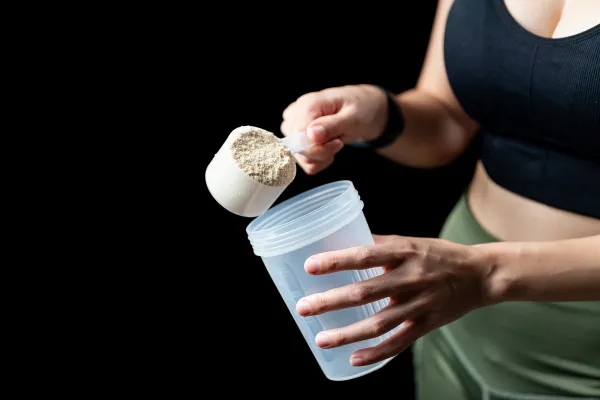
Creatine for Women Over 40: Strength, Energy, and Longevity
Why Creatine Isn’t Just for Bodybuilders
When women hear the word “creatine,” many think of bodybuilders, weight gain, or bloating. But research tells a different story.
For women over 40, creatine may be one of the most effective — and overlooked — supplements to support muscle, bone, and brain health.
What Is Creatine?
A naturally occurring compound produced in your body and found in foods like red meat and fish.
Stored in muscle and brain cells, where it helps regenerate ATP — your body’s quick energy currency.
Women often have lower baseline creatine levels than men, making supplementation especially beneficial.
Benefits of Creatine for Women Over 40
1. Preserve and Build Muscle
After 40, women naturally lose muscle (sarcopenia). Pairing creatine with resistance training helps maintain and even build lean tissue.
2. Support Bone Health
Stronger muscles load bones better. Research suggests creatine, when combined with strength training, may positively impact bone density in post-menopausal women.
3. Boost Brain Energy
Creatine fuels the brain as well as muscles. Studies show potential benefits for memory, mental clarity, and reducing “brain fog.”
4. Improve Training and Recovery
Creatine helps you push harder in the gym, recover faster, and stay consistent — all essential as the body ages.
Common Myths About Creatine (and the Truth Behind Them)
Myth #1: “Creatine causes bloating.”
Not quite. You may notice a small increase in water weight at first, but that water is inside your muscles — not under your skin. It helps your muscles stay hydrated and perform better, not look puffy.
Myth #2: “Creatine is unsafe.”
Decades of research have shown that creatine monohydrate is safe for healthy adults when taken as directed (3–5 grams per day). It’s one of the most studied supplements in the world.
Myth #3: “It’s only for men.”
Actually, women may benefit even more. Since women typically start with lower natural creatine levels, supplementation can have a bigger impact on strength, recovery, and energy.
Myth #4: “You have to time it perfectly.”
Nope. Consistency beats timing. Whether you take it in your smoothie, coffee, or post-workout shake, the key is taking it every day.
How to Use Creatine Safely
Form: Creatine monohydrate (most studied and effective).
Dose: 3–5 g per day. A loading phase isn’t necessary.
Hydration: Drink water consistently, since creatine pulls water into muscles.
Pair with strength training: Creatine works best when muscles are challenged.
Check with your doctor if you have kidney disease or take specific medications.
What Creatine Looks Like in Real Life
To help you picture it, here’s an example of how a woman over 40 might add creatine into her routine:
Morning coffee or smoothie: Stir in 5 g of creatine monohydrate powder.
Training days vs. rest days: Keep the dose the same — it’s about consistency, not timing.
With or without food: Both are fine; creatine absorption doesn’t depend on meals.
Disclaimer: This information is for educational purposes only and not intended as medical advice. If you have health conditions or concerns, consult with your healthcare provider before adding new supplements.
The 2PiFit Approach
Creatine isn’t a magic pill. It won’t replace strength training, good nutrition, or recovery. But for women over 40, it can be an evidence-based tool that supports the bigger picture of staying strong, lean, and healthy.
At 2PiFit, we help you cut through the noise, understand the science, and implement strategies that fit your real life.
Ready to Feel the Difference?
At 2PiFit, we design custom training and nutrition plans for women over 40 who want to:
Get stronger without “bulking up”
Protect their bones and muscle as they age
Boost energy and confidence in and out of the gym
Want to know how creatine and the right training could work for you? Schedule a discovery call with our coaching team today.
References & Further Reading
Kreider RB, et al. International Society of Sports Nutrition position stand: safety and efficacy of creatine supplementation in exercise, sport, and medicine. Journal of the International Society of Sports Nutrition. 2017;14(1):18. Link
Forbes SC, et al. Effects of creatine supplementation on properties of muscle, bone, and brain function in older adults. Aging and Disease. 2021;12(5):1169–1189. Link
Candow DG, Chilibeck PD. Potential of creatine supplementation for improving aging bone health. Journal of Nutrition, Health & Aging. 2016;20(6):677–683. Link
Smith-Ryan AE, et al. Creatine supplementation in women: a review. Journal of the International Society of Sports Nutrition. 2021;18(1):24. Link
Disclaimer: This blog post is for informational purposes only and is not intended to diagnose, treat, or replace medical advice from your healthcare provider. Always consult with your physician or a qualified health professional before making significant changes to your diet, exercise routine, or health practices.
